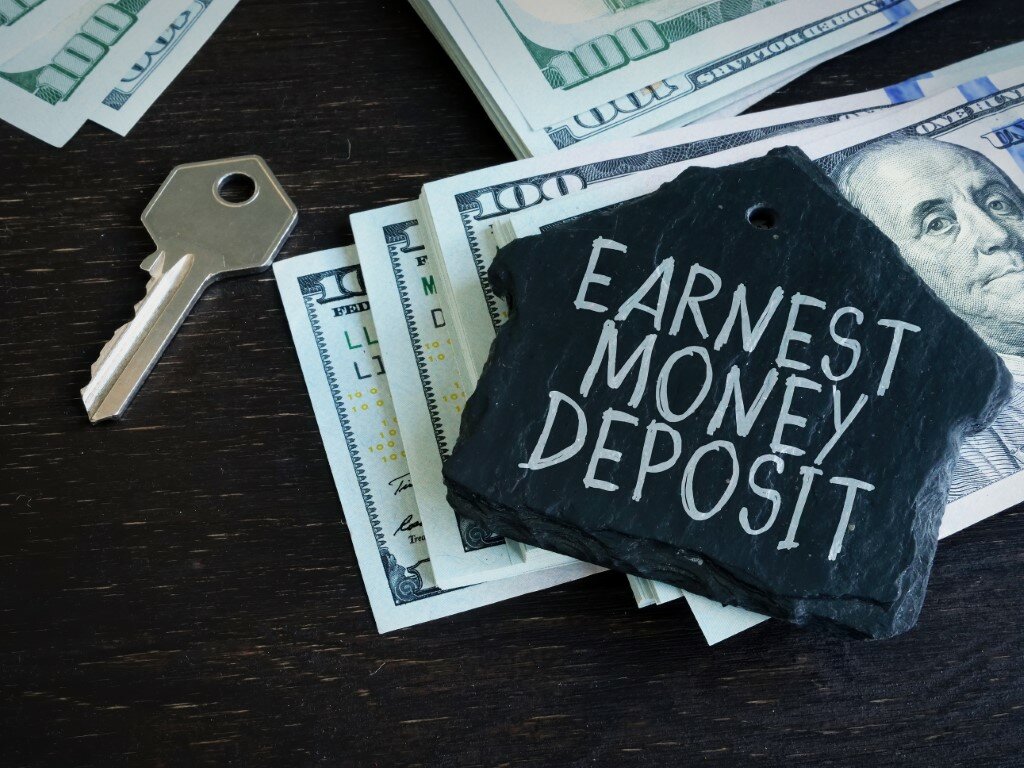
Several terms get thrown around in the real estate industry (earnest money deposit, down payment, escrow account, contingencies, agent commissions, and more). For those that aren’t heavily involved with real estate, these terms can be overwhelming, and most have accepted that they will always be confused.

Most of the terms in real estate work together, but they all serve separate functions. The purpose of this article is to make a distinction between an earnest money deposit and a down payment. We will define what they are and the intricacies of each one.
In reality, earnest money and down payments are not very closely related. However, because they are both upfront payments, many people lump them together.
Do you want to get some clarity between earnest money and a down payment on a house? Keep reading to learn the difference!
What is Earnest Money?
An earnest money deposit is a sum of money that the buyer deposits in tandem with a signed real estate purchase contract. This deposit shows the property seller that the buyer is acting in good faith and is serious about buying it.
Without an earnest money deposit, a buyer could tie up a property for a month or more and then back out of the deal without repercussions. In this scenario, the seller would have to go through the hassle of re-listing the house and covering the mortgage payments in the meantime.
Because an earnest money deposit is part of nearly every real estate transaction, the seller has this security to fall back on if the buyer backs out for any reason outside of the contingencies in the contract. In these cases, the seller gets to keep the earnest money.
What is a Down Payment?

A down payment is the portion of the purchase price the buyer pays out of their own pocket. Most real estate purchases are not 100% financed by a lender, so the buyer makes up the difference between the purchase price and the loan amount with a down payment.
For a house that sells at fair market value, the down payment that the buyer makes will be the amount of equity they have at the time of purchase.
While an earnest money deposit is typically made with a personal check within a few days of the signed purchase agreement, the down payment is usually wired into the title company on the day of closing.
How Much Earnest Money is Enough?
The amount of earnest money given in a real estate deal is always negotiable. In general, sellers want to get as much as possible, and buyers want to give as little as possible. If an offer contains a very low earnest money deposit, a seller may perceive that the buyer is not very serious and is likely to back out. On the contrary, a buyer does not want to give any more than is necessary, just in case something unforeseen happens and they have to back out and forfeit their earnest money.
When selling a house in Huntsville AL, the average earnest money deposit is $1,000. However, there are many exceptions to this – sometimes it’s higher, and sometimes it’s lower. In other places in the country, the average is 1-2% of the home’s purchase price.
One thing to consider as a buyer is that a higher earnest money deposit results in a stronger offer. Many people focus only on price, but several other factors go into an offer on a home. Is it a cash offer, or will it be financed? What contingencies are included? Finally, home much earnest money is being offered to ensure the deal gets to the closing table?
How Much Down Payment for a House is Required?
The down payment required on a home purchase is entirely dictated by the type of loan being used. Here are some general requirements for different loan programs:
- Conventional Loan: Minimum of 5% down payment unless you are a first-time homebuyer, in which the minimum is 3%. If you put less than 20% down, you must pay private mortgage insurance (PMI) each month.
- FHA Loan: FHA loans only require a 3.5% down payment for buyers with credit scores over 580. However, if you put down less than 10% on an FHA loan, you will be required to pay PMI for the life of the loan.
- VA Loan: VA loans are reserved for veterans and their spouses and require no down payment. They also do not require the borrower to pay PMI.
Although there are minimum down payment amounts set by lenders, many buyers choose to pay more so their monthly payment will be lower. Mortgage payments are based on the original loan amount, the interest rate, and the length of the loan. Making a larger down payment reduces the loan amount, thereby decreasing the payment required each month.
Earnest Money vs Down Payment – When are They Paid?
Earnest money deposits are typically paid within a few days of an accepted offer and signed purchase contract. The contract often states how long the buyer has to submit the earnest money.
The down payment on a house purchase is typically made on the day of closing. The title company handling the closing will usually send the buyer and seller a settlement statement on closing day. This statement breaks down the fees and charges assigned to each party. At the bottom, it details the buyer’s total “cash to close” amount, which consists of their down payment and other closing costs. The buyer must wire transfer this amount to the title company prior to closing in order to fund the transaction.
The Legalities of Earnest Money

Nearly all earnest money deposits are held with the title company coordinating the transaction. Giving the earnest money directly to the seller is never recommended because they may refuse to give it back if the deal goes awry.
Although an earnest money deposit functions as security for the seller, there are ways that a buyer can back out of a deal and still get their deposit back. Most real estate purchase agreements contain contingencies that allow the buyer to cancel the contract and get their earnest money back if specific stipulations are not met. Some of the most common contingencies are an inspection contingency, appraisal contingency, and financing contingency.
However, if the buyer backs out of the deal for any other reason, the seller is entitled to keep the earnest money as liquidated damages.
What Happens to Earnest Money at Closing?
The settlement statement generated by the closing attorney includes all of the closing costs and down payment required from the buyer, but it also takes into account the earnest money deposit. The earnest money is credited toward the buyer’s cash to close amount.
For example, if the buyer gave an earnest money deposit of $1,000 and their down payment and closing costs add up to $30,000, they will need to wire in $29,000 to complete the sale.
Final Thoughts on Earnest Money vs Down Payment
Earnest money and down payments serve two separate functions in real estate, but they are somewhat related.
Bottom line, earnest money is the deposit that the buyer makes to give security to the seller in case of default, and the down payment is the portion of the purchase price the buyer contributes in tandem with their new loan.
We hope this article has given you some clarity on the real estate transaction process. Although each real estate market is different, the same principles apply everywhere.
Good luck buying or selling your home! If you are in Huntsville or the surrounding areas, feel free to reach out and see how we buy houses and make the process super simple!
